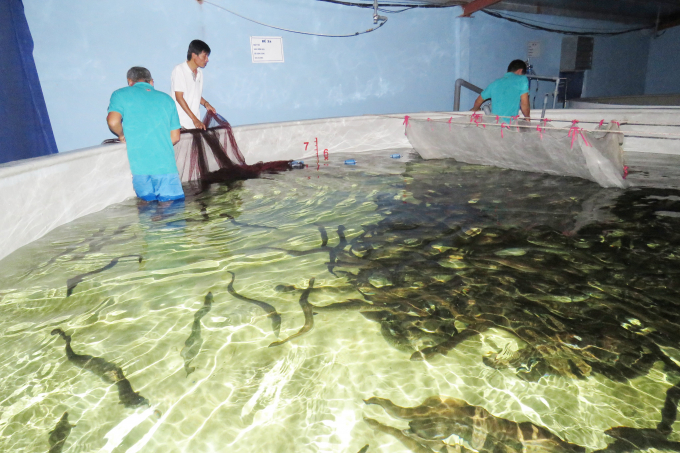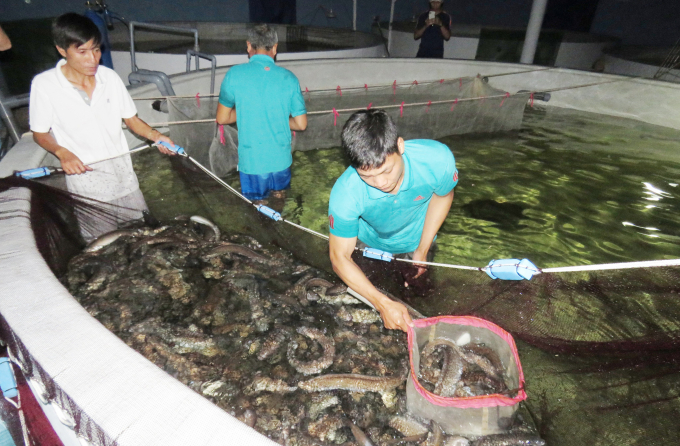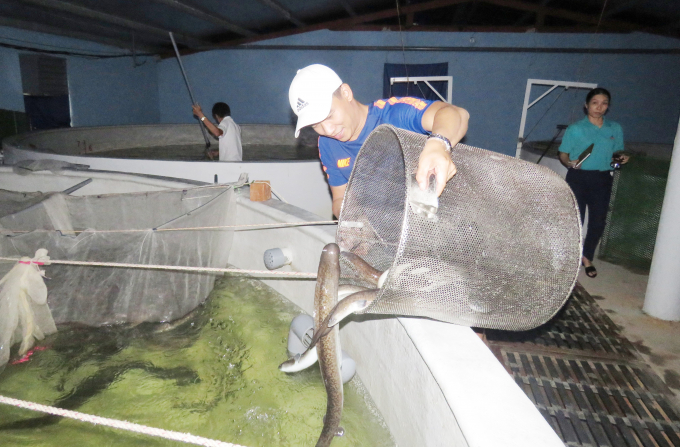June 1, 2025 | 21:23 GMT +7
June 1, 2025 | 21:23 GMT +7
Hotline: 0913.378.918
June 1, 2025 | 21:23 GMT +7
Hotline: 0913.378.918
Starting the business in 2007, Mr. Le Ha Giang conducted research and decided to invest in raising freshwater eels because of passion. At that time, he renovated two approximately 1,600m2 wide ponds in Bac Ly, Dong Hoi City as a start. Working, learning, and drawing lessons from experience, he just wanted to make up for the loss of capital first, not mentioning any profit or loss.
Mr. Giang at that time only went to buy and collect small eels living naturally in streams and rivers because people caught them and brought them back to raise them. The eels were sellable after nearly five years of raising when the fish had weighed approximately 1 kg.

Eels are raised according to high-tech processes in the coastal sandy area at the farm of Kim Long Vietnam Service Co., Ltd. Photo: T.P.
After nearly 10 years of raising this specialty, Mr. Giang changed his model from raising freshwater eels in earthen ponds to raising them in cement tanks and then to tarpaulin-lined ponds. There were years when the revenue exceeded VND 1 billion. At the end of 2016, a big flood swept through the area where Mr. Giang's family raised the eels. Floods tore down fences and walls protecting the eel farms, washing away nearly ten tons of freshwater eels ready to harvest. More than VND 3 billion drifted with the flood in just one night. The couple came back to the starting point empty-handed.
Not giving in to life's misfortunes, after a few months of resting for peace of mind, Mr. Giang resumed his unfulfilled dream. At the beginning of 2017, Mr. Giang and his wife traveled a long distance to Nha Trang to learn the experience of raising freshwater eels using new technology. To avoid floods, Mr. Giang chose coastal sandy areas to build a new farm and apply high technology in nursery procedure, raising eels in accordance with export standards.

Commercial eels are released to the market when reached the selling weight. Photo: T.P.
The new farming technology was applied along with a model of cement tanks floating on the ground. The rearing area is covered with a glass roof to prevent heat and minimize light. The temperature of the water entering the farming area is not too hot or too cold. According to Mr. Giang, the difference here was that the ponds were covered to remain in the dark, limiting noise and light to the maximum. "In this way, the eels won’t be disturbed when eating by outside factors.”
Mr. Giang said that his high-tech freshwater eel farming model used feeds from clean industrial processing sources. Using omnivorous food sources might greatly affect the water source and made it difficult to control harmful bacteria.

Freshwater eels are raised according to high-tech procedures in the coastal sandy area at the farm of Mr. Giang’s company. Photo: T.P.
Not only providing commercial freshwater eel meat, his company, Kim Long Vietnam Service Co., Ltd., also focuses on another service segment: supplying eel seeds to the market at present. Six ponds on the farm (each with a capacity of 30m3 of water) are used to nurse and raise fingerlings. Every year the company produces nearly 40,000 fingerlings and sells over 10,000 mature freshwater eels. It is known that the company's eel seeds are not only supplied to farming households in the province but also sold to the markets of Quang Tri, Ha Tinh, and Hai Phong. "Up to now, our revenue has reached approximately VND 4 billion. We are striving to reach VND 6 billion".
After nearly two years of production hiatus because of the Covid-19 pandemic, the company is expanding production by doubling the number of ponds. The company has recently brought back 5,000 imported giant mottled eels for stocking in two lakes. After running the rearing procedure after a long break, the company has continued to import and release approximately 20,000 eel breeds raised in ten lakes to quickly meet the market demand. “Giant mottled eel is qualified for export to the Korean and Japanese markets. The total quantity of seeds we imported in this batch is 25,000. It is expected that by this New Year 40% of the batch will be exported with an output of 8-10 tons and estimated revenue of VND 4 billion," said Mr. Giang.
Translated by Samuel Pham

(VAN) Several scientists and farmers are experimenting with soil treatment in some key durian-growing regions such as Cai Lay (Tien Giang), Dak Song, Gia Nghia, and Dak R’lap (Dak Nong).
/2025/05/25/4127-3-073637_820.jpg)
(VAN) Thanks to the promotion from an FAO-implemented project, vegetable production in greenhouses in Moc Chau has seen strong development, from 1.5 hectares in 2021 to nearly 50 hectares in 2024.

(VAN) FAO has recently supported USD 140,000 to implement the project 'Risk mitigation human-animal interface risks through disease control initiatives in pig farming.'

(VAN) The People's Committee of Tra Vinh province has approved an adjustment to the investment policy for the Green Hydrogen Plant project, increasing its area to approximately 52.76 hectares.
![Reducing emissions from rice fields: [2] Farmers’ commitment to the soil](https://t.ex-cdn.com/nongnghiepmoitruong.vn/608w/files/news/2025/05/05/dsc08881jpg-nongnghiep-140632.jpg)
(VAN) Clean rice cultivation model in Thuong Tan commune, Bac Tan Uyen district, is assisting local residents in achieving sustainable agriculture by substantially reducing costs, increasing productivity, and protecting the environment.

(VAN) At the conference to disseminate Resolution No. 68, AgriS introduced its digital agricultural ecosystem and reaffirmed its commitment to accompanying the Government in promoting private sector development and sustainable agriculture.

(VAN) 'Blue Ocean - Blue Foods' initiative is designed to restore marine ecosystems and establish sustainable livelihoods for local communities by cultivating a minimum of 1,000 hectares of cottonii seaweed in the first three years.